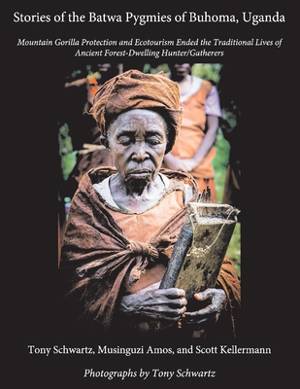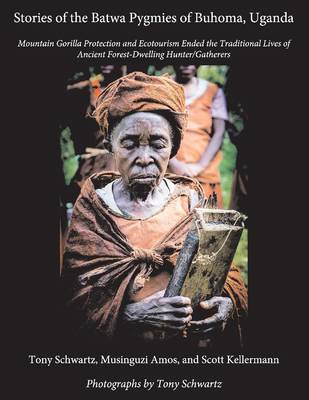
Je cadeautjes zeker op tijd in huis hebben voor de feestdagen? Kom langs in onze winkels en vind het perfecte geschenk!
- Afhalen na 1 uur in een winkel met voorraad
- Gratis thuislevering in België vanaf € 30
- Ruim aanbod met 7 miljoen producten
Je cadeautjes zeker op tijd in huis hebben voor de feestdagen? Kom langs in onze winkels en vind het perfecte geschenk!
- Afhalen na 1 uur in een winkel met voorraad
- Gratis thuislevering in België vanaf € 30
- Ruim aanbod met 7 miljoen producten
Zoeken
Stories of the Batwa Pygmies of Buhoma, Uganda
Mountain Gorilla Protection and Ecotourism Ended the Traditional Lives of Ancient Forest-Dwelling Hunter/Gatherers Volume 1
Tony Schwartz, Musinguzi Amos, Scott Kellermann
Paperback | Engels
€ 50,45
+ 100 punten
Omschrijving
Attempts to protect endangered animal species often have negatively impacted powerless indigenous people living traditional lifestyles. This photo-essay illustrates one such example: How the laudable effort to protect "Critically Endangered" mountain gorillas (and income-producing ecotourism) has affected the Batwa Pygmies of southwest Uganda, in East Africa. Until very recently, mountain gorillas were listed as "Critically Endangered" by the International Union for Conservation of nature (IUCN). Because of efforts at conservation, associated with income from ecotourism, the number rose to 680 in 2008, and by September 2016, to 880. In November 2018, the IUCN estimated that there were over 1,000 gorillas in Uganda, the Democratic Republic of Congo and Rwanda, and so they changed the classification of mountain gorillas from Critically Endangered to Endangered. The other subspecies of the eastern gorilla, Grauer's gorilla, is still listed as Critically Endangered, as are both subspecies of western gorilla (cross river and western lowland gorillas). The small-statured, hunter/gatherer Twa have lived for millennia in the forests of central Africa. The Twa of Uganda are known as Batwa Pygmies. There is evidence that the Batwa are one of the oldest races on earth. They are monotheistic, have a creation story predating Judaism that closely resembles the Garden of Eden story, and a language that may have influenced Indo-European languages (Hallet & Pelle, 1973). The population of Twa living in Rwanda, Burundi, Uganda and eastern Democratic Republic of Congo, has been estimated at 86,000 to 112,000, with approximately 6,700 Batwa residing in Uganda. Roughly 600 live in Bwindi. Despite nearly a 100% illiteracy rate among the adults, the Batwa have a rich oral tradition; many of their stories and legends having been passed down for countless generations. Since the dawn of man, the mountain gorillas and the Batwa lived alongside one another in the Bwindi Impenetrable Forest of Uganda. In 1992, however, the Batwa were evicted from that forest, when it became a national park, and was designated as a World Heritage Site. This occurred for the stated purpose of protecting endangered mountain gorillas. It is likely, however, that the Ugandan government also sought to protect the increasingly popular, income-generating ecotourism industry. Many of the Batwa now live in Buhoma, a village in which one of the park entrances is located. The Ugandan government has provided the Batwa with no reparation, jobs, or housing assistance. Nor have the Batwa shared in any income associated with ecotourism. In the year 2000, co-author Dr. Scott Kellermann found that 8 years after the eviction, 38% of the Batwa children died before their 5th birthday, translating to a life expectancy of only 28 years. Their annual mean income was $25. Despite improvements in their condition since then, they remain classified as "ultra-poor," i.e., they live on less than $0.80 per day. In December 2017, photographer Tony Schwartz interviewed nine Batwa. Photographs were acquired during the interviews, and demonstrations by the Batwa of how they previously had existed in the forest. They gave personal accounts of their former way of life, told a story derived from their ancient and rich oral history, and related the devastating and deadly effects the eviction has had on their lives and culture. We have reported these individual stories, experiences and perceptions, as it is our belief that the fabric of a people is comprised of individual threads.This book documents two opposing impacts of an effort to protect endangered wildlife. On the one hand, the population of mountain gorillas has increased associated with their protection. On the other hand, this has come at great expense to the Batwa Pygmies.
Specificaties
Betrokkenen
- Auteur(s):
- Uitgeverij:
Inhoud
- Aantal bladzijden:
- 76
- Taal:
- Engels
Eigenschappen
- Productcode (EAN):
- 9781543970371
- Verschijningsdatum:
- 5/06/2019
- Uitvoering:
- Paperback
- Formaat:
- Trade paperback (VS)
- Afmetingen:
- 216 mm x 279 mm
- Gewicht:
- 340 g

Alleen bij Standaard Boekhandel
+ 100 punten op je klantenkaart van Standaard Boekhandel
Beoordelingen
We publiceren alleen reviews die voldoen aan de voorwaarden voor reviews. Bekijk onze voorwaarden voor reviews.









